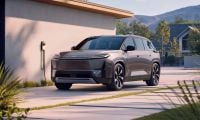GM gets praise for a well engineered battery thermal management system used on Chevy Volt, Chevy Bolt, Chevy Spark EV and the Cadillac ELR.
Few days ago the news broke out that Nissan Leaf required a third charge and that the range and the charging times of the new 2018 Nissan Leafs are misleading. See the story by Torque News and our commentary on Nissan Leaf charging time and range here.
I am following a discussion in GM EV Owners Group on Facebook where people say this is what you get for a cheap thermal management system for batteries and that Nissan is making EVs look bad to the general public.
Nissan Leaf's Passive Cooling
"This is what you get for using a cheap thermal management system for the batteries," writes Joe Real, a Chevy Volt Hypermiler from California in the discussion.
"The new Nissan Leaf uses passive cooling for their batteries. It's real world range is less than 151 miles. Compared to the Chevy Bolt whose real world range is over 250 miles and on the average, owners get 300 miles to a charge. The New Nissan Leaf has exaggerated their electric mile range.
"Moreover, if you have a long trip greater than 300 miles, the Nissan Leaf will only allow you fast charging once, and then the second charging on that same day would be super-slow to protect its batteries. This is because Nissan went on the cheap in their thermal battery management system.
"Unlike GM and Tesla that uses the more expensive active system using liquid coolant in their battery thermal management system to give their batteries minimal degradation and long life. With Nissan Leaf, if you fast charge every day, you'll have to replace it's propulsion batteries every 2 years. The highest mileage Chevy Volt today has passed more than 460,000 miles and there's very little degradation of the batteries, thanks to a well engineered thermal management system," Real says in the discussion.
Look How EV Battery Is Cooled When Deciding Which EV To Buy
Ivan Jue, who has contributed number of EV stories to Torque News, says don't look at the exterior of an EV when deciding which electric car to buy. Look at how its battery is cooled.
"What’s sad is Nissan has made EVs look bad to the general public. The concern for battery replacements and lost capacity is exactly what steers prospects away from EVs. Not everyone is aware of how essential a liquid-cooled thermal management system is to most environments for battery longevity.
"Most people only see the car ‘s exterior/interior and features, but aren’t aware about the most essential component—the battery and how it’s cooled.
"Toyota’s Prius Prime and Kia Niro also has air-cooled batteries. We’ll see how they fare over time, but some Fusion Energi owners in hot climates have already noticed capacity loss after a few years," writes Jue in the discussion.
The thing is that people are always swayed by the cheaper price without knowing the consequences of the cheaper cooling system that was used in the EV.
What were the major decision making factors that influenced your electric car buying? Did you know consider how the battery is cooled? Please, share your opinion in the comments section below for discussion.
Set as google preferred source












Comments
Does anyone know how Tesla
Permalink
Does anyone know how Tesla Model S and Model 3 batteries are cooled?
All Tesla batteries have
Permalink
In reply to Does anyone know how Tesla by Harey (not verified)
All Tesla batteries have state of the art cooling, possibly the best in the business.
They might introduce liquid
Permalink
They might introduce liquid cool in the future, but this should of been known before buying. We did not like the Bolt, to chunky and a want to be SUV with cheap interior...we research and knew this was a difference between the two cars, but most people don't buy the leaf car for distances of greater than 300 km....in winter passive cooling will work just fine...
Apparently Nissan is
Permalink
Apparently Nissan is addressing the battery cooling issue in the 2019 leaf, which will include active cooling.
Nope, the Nissan Leaf is
Permalink
In reply to Apparently Nissan is by Armen Hareyan
Nope, the Nissan Leaf is still air cooled in 2019.
Honestly, active cooling isn
Permalink
Honestly, active cooling isn't really needed unless you live in Arizona or Texas. I'm happy to pay less to not have it.
Did you even read the article
Permalink
In reply to Honestly, active cooling isn by Rob (not verified)
Did you even read the article? If you charge every day ty out will need new batteries in 2 years. Only one fast charge allowed per day. Its junk, but the Volt. Best car i've ever owned.
You cant even fast charge a
Permalink
In reply to Did you even read the article by Brig (not verified)
You cant even fast charge a Chevy Volt!
You never need to fast charge
Permalink
In reply to You cant even fast charge a by Serge (not verified)
You never need to fast charge a Volt because when you run out of battery charge you just use the gas backup generator to drive as far as you need to. Zero anxiety.
Well I live in Palm Springs,
Permalink
In reply to Honestly, active cooling isn by Rob (not verified)
Well I live in Palm Springs, CA where it was 118° on Friday and it will be getting even hotter as we get further into the summer. My Volt purchase a few days ago was certainly the right decision. P.S., There are lots and lots of hot places in the U.S. besides little ole Texas and Arizona. Not very many of us have cool Rocky Mountain summers.
Regrettably, that is not
Permalink
In reply to Honestly, active cooling isn by Rob (not verified)
Regrettably, that is not correct. Your battery will suffer. You must be driving a Leaf.
while its true if you don't
Permalink
In reply to Honestly, active cooling isn by Rob (not verified)
while its true if you don't travel far in your ev, cooling the battery is less of an issue. it is when you attempt to recharge during a trip, especially at a fast charger that the trouble begins. batteries don't like to be charged when over heated. this is what causes Leaf batteries to degrade faster than others. many ev owners are just learning how to recharge their cars with battery degradation in mind. during hot weather, keeping your car at less than 80% will help a lot with longevity. bottom line, these cars cost plenty, and if Chevy and others can include liquid cooling, Nissan also should. i'm certain the new leaf 60kWh pack will have liquid cooling.
Tesla does the battery
Permalink
Tesla does the battery cooling the superior but more expensive way... It’s worth informing people about these differences if they’re unaware. But yeah - bottom line is you couldn’t buy a Leaf or an electric Smart4Two or other cars like them at the price points they’re at otherwise. If they’ll cover failing batteries under a decent warranty and they’re not as costly a battery as a huge Tesla battery (hint: they’re not)? It may not matter much. Pay for battery swaps if and when needed and you’ll still be better off cost-wise than having paid a lot more for the car.
There's an old saying that
Permalink
In reply to Tesla does the battery by Tom (not verified)
There's an old saying that goes: "Batteries don't die, they're murdered." The idea that you can forget about cooling these batteries and just replace them later is flawed and counterproductive. A big reason some people switch to an EV is to get away from the culture of consumption. Every battery manufactured for a Nissan Leaf will die and have to be replaced. What happens to it then? Landfill? Or is there some other chemical process to recycle it? Either way it's an ecological mess and expensive to rectify. Used batteries from GM and Tesla on the other hand are regularly resold after the car they were in is retired. These are put to use in datacenters, grid power backups or, gasp, other cars; all because someone made the decision to protect that asset by cooling it. To me, that alone is a huge deciding factor on which manufacturer should get my money.
How the batteries are cooled
Permalink
How the batteries are cooled or heated is important to know, especially if you live in warmer climates. It definitely is not a point that Nissan mentioned in advertising, but most anyone who knows a Leaf owner has heard stories of the loss of range over time because the batteries are air cooled. Also range can be shortened by overcharging the batteries as well. I have two friends who owned Leafs, and the range was supposed to be 90-100 miles when new, but it was realistically around 72 miles. The difficulty for one of the friends was that his daily commute to work was 50 miles round trip, and depending on temp, speed, and load he was having a harder and harder time of making the 50 mi. round trip with any miles left over. Over 3 years of driving his real battery range went from 70 miles to 52 miles, and I believe that was because the batteries were air cooled.
I've had 3 Volts and so far none of them lost range over time. The Volt's batteries are similarly affected by temperature, speed, and load, but I averaged between 35 and 46 miles per charge (it was rated at 38 miles), and with all 3 Volts the maximum range remained the same as long as I had the cars, and I attribute the fact that there was no range degradation to the active cooling and heating of the batteries.
The Tesla, Volt, and Bolt all use liquid glycol for cooling, but the designs are different. The Tesla has a single cooling tube that snakes coolant through each battery. The Volt has coolant channels that run in plates that separate each battery, and the Bolt (like BMW's EV cooling design) uses bottom cooling plates beneath the batteries to manage the temperatures.
My friend whose Leaf could no longer make it to work and back has since bought a 2017 Volt, and interestingly the new Volt gets 58 miles of range, so he makes it to work and back without using gas. He has had the new Volt for a year now and he said that the range is unchanged.
This is correct. GMs battery
Permalink
In reply to How the batteries are cooled by Dean McManis
This is correct. GMs battery cooling technology is superior to Tesla's, but even then batteries will still only last about 10 years (before dropping below 70% of original capacity), even with the best cooling and that is only when L2 charging is used. Frequent DC fast charging will reduce that lifespan further. Operating a car for more than 10 years is the environmentally responsible thing to do, so battery vehicles are not a good choice.
While the main content of
Permalink
While the main content of this article is true, some details were not included. First, many people charge at home, and will seldom if ever need to fast charge. That's an important bit if information that should have been included. My soul EV has air cooling, pushing cool air from the AC through the battery. It also scavenges heat in the winter and uses that to warm the battery pack. This system works great for most people in temperate climates. So, to make this article more complete, this extra info should be included.
I have the LEAF Gen1. I'm
Permalink
I have the LEAF Gen1. I'm North American and, yes, I think about 'range' limitations' while knowing, full well, I've basically bought the perfect 'Town Car'. I'm not kidding myself... It's challenging (can be fun) to think other than 'town car'. (I repeat: 'Hey Stupid.. It's a TOWN CAR'). Get it?
Nissan (& most buyers) are
Permalink
Nissan (& most buyers) are more interested in lease pricing, so the battery is designed to last 3 years.
"The highest mileage Chevy
Permalink
"The highest mileage Chevy Volt today has passed more than 460,000 miles and there's very little degradation of the batteries, thanks to a well engineered thermal management system," Real says in the discussion."
Chevy Volts don't have a fast charge capability, this statement is asinine in the context of discussion.
The lack of thermal battery
Permalink
The lack of thermal battery manager is what led me to pass on a Leaf and get a used BMW i3.
This article is full of
Permalink
This article is full of factual errors. Few EV owners know the range of their vehicles - you don't necessarily start a trip at 100% charge nor do you end at 0%. And conditions vary. The Bolt would not exist without the Leaf. They are, until 2019 at least, apples and oranges. When we compared the Bolt to the Leaf (2017), the lease price on a Leaf was 1/3 that of a Bolt! Plus every Chevy dealer had no DCFC and broken level 2 stations. So sad to see Bolt drivers struggling to charge their cars at stations in CA paid for by Japanese gov't that charge at 36kW/hr because Chevy did not build infrastructure to support their parasitic cars. We regularly drive our inferior Leaf 200-250 miles/day in 105 degree heat with 3-4 DCFC stops. No battery degradation thus far according to Nissan; yes it has turtled to limit output but we still can go 65 under those conditions. Battery will cool rapidly while you break for dinner or even while driving at night. At 11 battery temp bars (out of 12), car will still charge at 30kW/hr. Others report 600 mile trips in one day in summer heat. I would like to see actual sources regarding long-term battery disposition before being convinced. Is Tesla the only responsible electric car maker?
The Chevy dealers that I have
Permalink
In reply to This article is full of by Blue Lectroid (not verified)
The Chevy dealers that I have encountered (including the one where I purchased my 2017 Bolt EV) have a (2) L2 chargers (usable by anyone & any brand just like the Nissan dealers) and DC Fast Chargers (one inside and one outside). You usually have to get permission to use the DCFC. I'm on the East Coast in the Philadelphia, PA area. Now this is as of 2018. In 2017, while most had L2 chargers in 2017 the DCFC were absent.
So it appears things are changing. BTW I love my Bolt as every Bolt owner I have encountered; It's not just a great EV , it's just a great and versatile car.
My son is on his second leaf
Permalink
My son is on his second leaf - the first was a 2013
lease - he turned it in at 36 months- second he purchased used. is now 5 years old and just about to the third lost bar. To maintain battery life he no longer fully discharges nor fully charges his leaf other than if it is absolutely needed. The leaf is only used minimally during the week taking kids to school etc. and he keeps it at about 50% charge and almost never lets it get to 100% charge unless he is going to drive it immediately. (and he NEVER fast charges it) He has level one and level two chargers in garage the max being a 6.6 KW.
He also has an e Fiat that is used by his wife as her daily driver she drives 51 miles each way and is able to charge at work. She charges at work with a level one until about 2pm them switches to a level 2 till 5pm - is timed so that it is driven almost immediately after the full charge is achieved.They do something similar in the evening - but she leaves for work with each am with about an 80% charge.She is able to do this as she does not use ac in the am plus drive to work has a drop in elevation.The Fiat is now at about 70
% capacity. He bought both of these e cars for around $8000 to $9000 dollars and pretty much driving them for close to free as he charges at around 6 cents per KW.
He still loves the leaf and tells me he will buy a replacement battery when battery will no longer support their needs.
After seeing his experience with the leafs I purchased a 2015 chevy volt new in Oct of 2015. I now have 35000 miles on it with no noticeable battery range loss. Love the car , I have had one program fix (in 3 1/2 year) by the dealer as car would not charge Now have received a recall notice re. battery voltage issue where car may shut down if a cell voltage drops too low. Have yet to have that done. I have a level one and a level 2 (3.2KW) charger in garage - went for one year using level one but now with level 2 have stopped using the level 1.
All in all a learning experience for both of us.